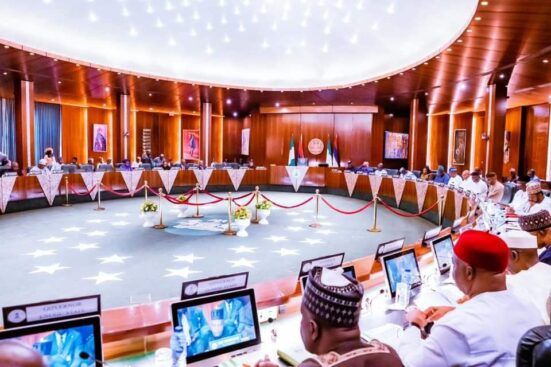The National Economic Council (NEV) has announced that it would adopt measures to speed up the decentralization of the national grid, with a view to putting an end to incessant collapse that has plunged some states in the North into total darkness.
This was disclosed by the Vive President, Kashim Shettima, who chaired the Council meeting at the Presidential Villa on Thursday, October 31.
According to a press release issued by his spokesman, Stanley Nkwocha, Shettima listed some of the measures for the decentralization of the national grid to include the establishment of mini-grids, solar and renewable energy sources like solar photovoltaic and wind turbines.
He said the burden of accountability has compelled the government to never look away from these issues.
Shettima stressed the urgent need for the implementation of the Nigeria Energy Sector Implementation Plan (NESIP), emphasizing that the energy sector must embrace the potential of renewable energy, as well as leverage solar and mini-grid solutions designed to meet regional electricity demands.
The Vice President said, “A robust economy is the backbone of every nation. The recent blackouts caused by the actions of vandals remind us of our urgent need to expand our energy infrastructure. I believe the governors here would agree that the decentralisation of electricity is our path forward.
“We will continue to promote the constitutional framework that empowers constituent states within the Nigerian federation to generate, transmit, and distribute electricity in areas covered by the national grid. Together, we can make instability a relic of the past.
“Furthermore, our energy sector must embrace the potential of renewable energy. We must leverage solar and mini-grid solutions tailored to regional needs. I urge the Council to support the implementation of the Nigeria Energy Sector Implementation Plan (NESIP).
“If we capitalise on our diverse regional energy resources—from northern Nigeria’s solar potential to the south’s gas reserves—we can build a resilient, decentralized energy system that drives growth and empowers our communities.”
On Human Capital Index, Shettima cautioned that it was a tragedy that must be confronted following Nigeria’s low ranking.
“We grapple with alarming statistics related to life expectancy, maternal and child mortality, and educational attainment. We gather here today to redeem this dark reality through a series of deliberations and recommendations across various sectors, to be presented by participating specialists in government and by development partners,” he stated.
He further shed light on the progress made so far in the bid to mitigate flood disasters, noting that “the past few months have tested the durability of the solutions” implemented to advance flood resilience.
He continued: “Although the floods caught many of us off guard in various parts of the nation, our proactive mitigation efforts have inspired sustainable strategies to address the extensive damage caused, including significant property losses and health risks.
“I commend the Honourable Minister of Water Resources and the Director-General of the National Emergency Management Agency (NEMA) for their foresight and swift action.
“Today invites us to reinforce our commitment to implementing approved mitigation measures, ensuring that states report their flood damages comprehensively, as outlined in our NEC Ad-hoc Committee report.”
Minister of Finance and Coordinating Minister of the Economy, Mr. Wale Edun, briefed the Council on several key national accounts.
According to his report, the Excess Crude Account stands at $473,754.57, the Natural Resources Fund at ₦26,105,837,627.67, and the Stabilization Account at ₦36,299,452,763.62.







